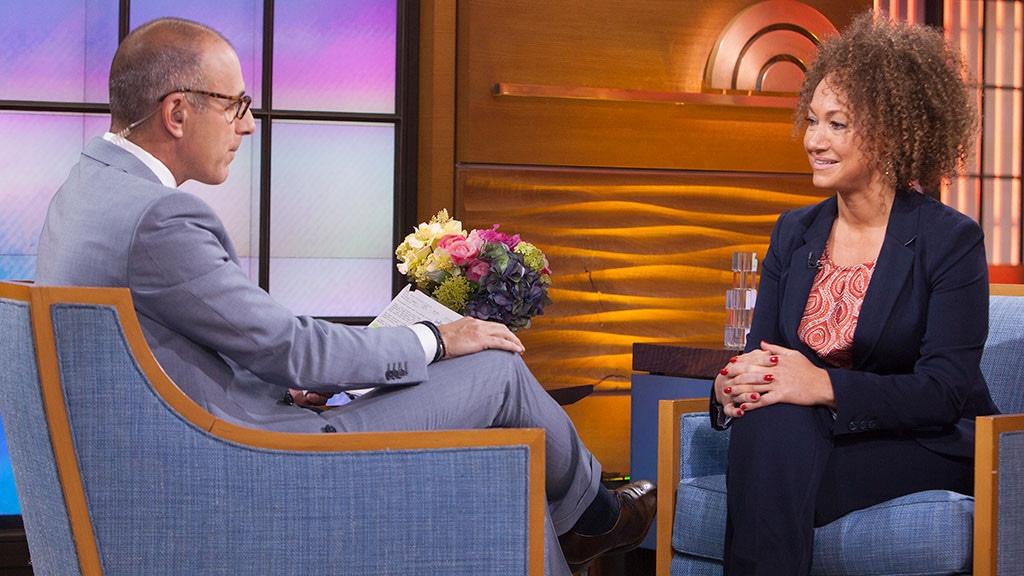 NBC News’ “TODAY”/Anthony Quintano
NBC News’ “TODAY”/Anthony QuintanoRachel Dolezal, the former NAACP Spokane chapter president who was accused of lying about her race, told Today's Matt Lauer Tuesday that she identifies as black—something she started doing at age 5. "I was drawing self-portraits with the brown crayon instead of the peach crayon," she recalled. That said, she added, "It was a little more complex than me identifying as black." Matt noted she has given "mixed signals" about her race, so the journalist asked her point blank if she is an "African American woman."
Rachel replied, "I identify as black."
Matt showed Rachel a picture taken during her teen years and asked her to define her racial identity at the time. "I would say visually she would be identified as white by people who see her," she said. Matt followed up by asking, "At the time, were you identifying yourself as African American?" Rachel replied, "In that picture, during that time, no."
At the beginning of the interview, Matt asked Rachel about the backlash, saying, "Did this come as a surprise to you, or did you always expect that the lid would be blown off your story at some point?" She replied, "The timing of it was a shock. I mean, wow. The timing was completely unexpected. As to the second question, I did feel that at some point I would need to address the complexity of my identity."
On Monday afternoon, Rachel resigned from her position as president of the NAACP's Spokane, Wash., chapter amid the controversy surrounding claims she made regarding her race and upbringing. Earlier that morning, Rachel's parents told Today that their daughter pretended to be black, claimed to be born in a teepee and made other false claims to possibly "damage her biological family." They also addressed her race identity, saying, "She's clearly our birth daughter and we're clearly Caucasian. That's just a fact."
Rachel was asked to respond to their statements Tuesday. "I don't really see why they're in a rush to whitewash some of the work that I have done and who I am and how I've identified," she said. "This goes back to a very early age with myself identification with the black experience, as a very young child."
"When did you start deceiving people?" Matt asked.
"I was actually identified when I was doing human rights work in North Idaho as first transracial. And then when some of the opposition to some of the human rights work I was doing came forward and started, the next newspaper article identified me as a being a biracial woman. The next article, when there were actually burglaries, nooses, etc. was. 'This is happening to a black woman. 'And I never corrected that," Rachel explained. Matt asked, "Why didn't you correct them? You knew it wasn't true." Rachel responded, "Because it's more complex than being true or false in that particular instance."
Matt noted Rachel's appearance, saying, "Your complexion appears darker than it did in the photos of you as a young lady. Have you done something to darken your complexion?" She smiled and said, "I certainly don't stay out of the sun. I also don't, as some of the critics have said, put on blackface as a performance...I have a huge issue with blackface. This is not some freak birth of a nation mockery blackface performance. This is on a very real, connected level how...I've actually had to go there with the experience, not just the visible representation, but with the experience. And the point at which that really solidified was when I got full custody of Isaiah. He said, 'You're my real mom.' He's in high school. For that to be something that is plausible, I certainly can't be seen as white and be Isaiah's mom."
Asked if she would "make the same choices" today, given what she knows now, Rachel said, "I would."
"What discussion do you want to prompt?" Matt asked.
"Well, as much as this discussion has somewhat been at my expense recently in a very sort of viciously inhumane way come out of the woodwork, the discussion is really about what it is to be human. And I hope that that really can drive at the core of definitions of race, ethnicity, culture, self- determination, personal agency and ultimately empowerment," Rachel said, prompting Matt to ask, "Wouldn't you go back and perhaps be a little more transparent about certain things in your life or correct some of the things that were said about you that you knew to be incorrect?" Rachel smiled once again and admitted, "You know, there are probably a couple interviews that I would do a little different if circumstances in retrospect I knew what I know now. But overall, my life has been one of survival and the decisions that I have made along the way—including my identification—have to been survive and to carry forward in my journey and life continuum."
Matt then cut to her sons, Isaiah and Franklin, who were seated elsewhere in the studio. "If I were to ask them if you're a black woman or a Caucasian woman, how do you think they'd answer?" he asked.
"Well, I actually was talking to one of my sons yesterday and he said, 'Mom, racially you're human and culturally you're black.' So, I mean, you know, we've had these conversations over the years," Rachel explained. "I do know that they support the way that I identify and they support me. Ultimately we have each other's back. We're the three musketeers."
(E! and NBC are both members of the NBCUniversal family.)